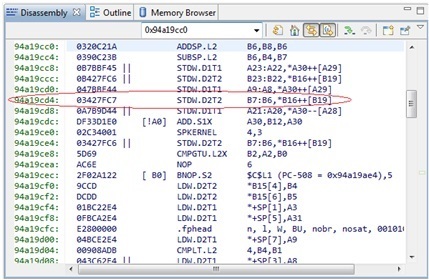Other Parts Discussed in Thread: SYSBIOS
Hello,
I am using a DM8148 custom board, and running on the C674x using EZSDK_5_03_01_15 components.
components:
- bios 6.32.05.54
- cgt6x_7_3_1
- c674x-dsplib_1_03_00_00
In my DSP application, I have a high priority and short GPIO HWI.
and three SWIs, with different priorities, running each the DSPF_sp_fftSPxSP kernel.
the application runs for a while and then the code abort() with a loop buffer exception that point inside the DSPF_sp_fftSPxSP function.
From my understanding, the FFT kernel use SPLOOP so It means it's interruptible.
I have increase drastically my program stack just in case nesting those interrupts could cause a stack overflow.
I do not understand what can cause a loop buffer ecxeption.
the compiler should backup/restore the loop buffer content from/into the stack, isn't it?
attached my project .cfg file and .map file.
exception system_printf dump :
[C674X_0] A0=0xfffffff4 A1=0xfffffffa
[C674X_0] A2=0x2 A3=0xbd08eec1
[C674X_0] A4=0xbbcbc1ec A5=0x942afda0
[C674X_0] A6=0x3c8a296e A7=0x3c488329
[C674X_0] A8=0xbc130142 A9=0xbbf71dae
[C674X_0] A10=0xbcca3258 A11=0xbc9a7b3e
[C674X_0] A12=0xbc153b72 A13=0x3d139de2
[C674X_0] A14=0x18 A15=0xa46fa1d2
[C674X_0] A16=0xbc58aa04 A17=0xbbe0b4eb
[C674X_0] A18=0xbf3504f3 A19=0xa3830474
[C674X_0] A20=0x3c5e3522 A21=0x3bf1b9a2
[C674X_0] A22=0xbc95049c A23=0xbb44b5d4
[C674X_0] A24=0x3f3504f3 A25=0x3f3504f3
[C674X_0] A26=0x18 A27=0x942afd10
[C674X_0] A28=0x16 A29=0x8
[C674X_0] A30=0x9429a880 A31=0x9429a7f0
[C674X_0] B0=0x3f0e39da B1=0x3f54db31
[C674X_0] B2=0x8 B3=0x16
[C674X_0] B4=0xbc09e63c B5=0xbcc51402
[C674X_0] B6=0x3b05921e B7=0x3c065a70
[C674X_0] B8=0xbc296d40 B9=0x3cb66404
[C674X_0] B10=0x3cf28032 B11=0x3b109372
[C674X_0] B12=0xc0 B13=0x7e0
[C674X_0] B14=0x942d3788 B15=0x9524fe70
[C674X_0] B16=0x9429a8c8 B17=0x3b9f4696
[C674X_0] B18=0x942afda0 B19=0x8
[C674X_0] B20=0x3d87c50c B21=0xbbd5f90b
[C674X_0] B22=0xbd925cb6 B23=0x3b9cee52
[C674X_0] B24=0xbf7b14be B25=0x3e47c5c2
[C674X_0] B26=0x3cba7581 B27=0x3c444886
[C674X_0] B28=0x3bacadac B29=0x3c970ca9
[C674X_0] B30=0xbcb2f485 B31=0x3a092540
[C674X_0] NTSR=0x1420f
[C674X_0] ITSR=0x420f
[C674X_0] IRP=0x9526978c
[C674X_0] SSR=0x0
[C674X_0] AMR=0x0
[C674X_0] RILC=0x40
[C674X_0] ILC=0x24
[C674X_0] Exception at 0x95269954
[C674X_0] EFR=0x2 NRP=0x95269954
[C674X_0] Internal exception: IERR=0x90
[C674X_0] Resource conflict exception
[C674X_0] Loop buffer exception
[C674X_0] ti.sysbios.family.c64p.Exception: line 248: E_exceptionMin: pc = 0x9526978c, sp = 0x9524fe70.
[C674X_0] xdc.runtime.Error.raise: terminating execution


